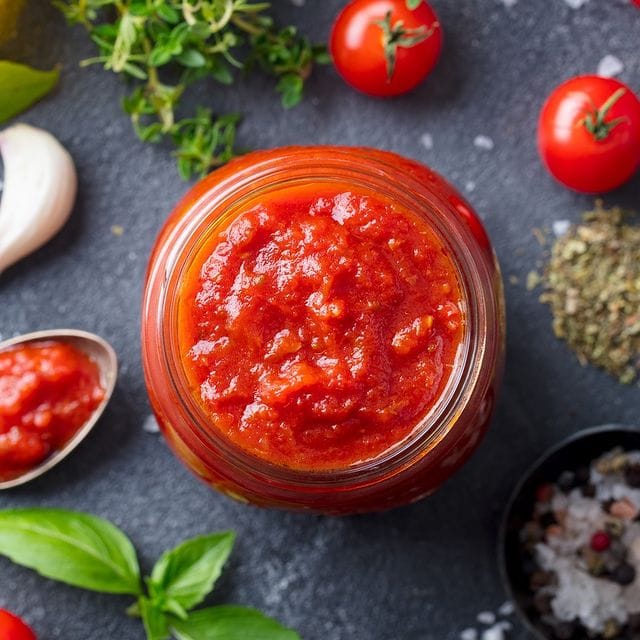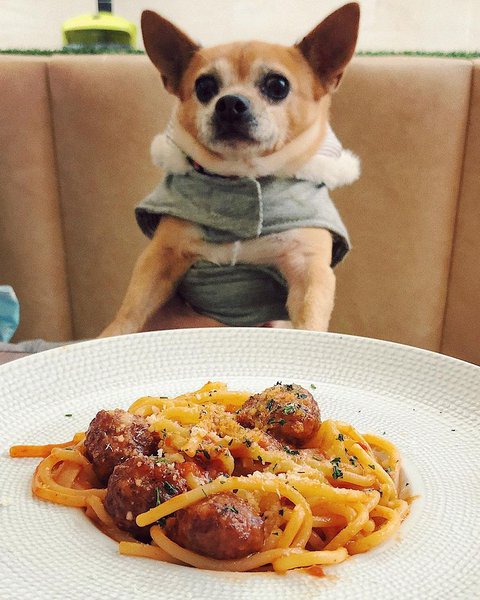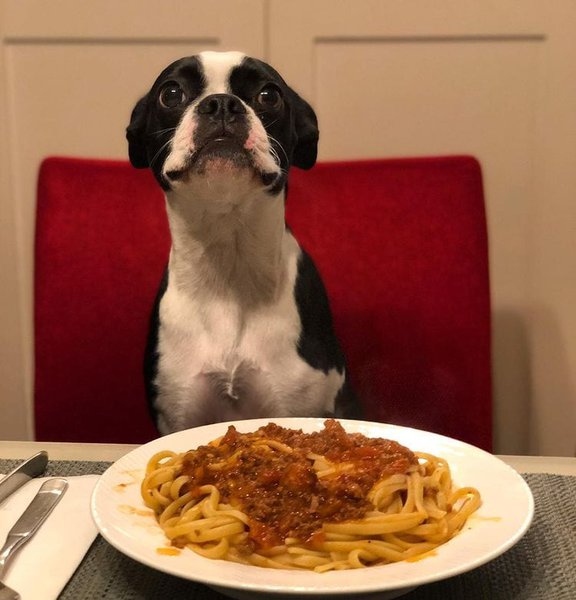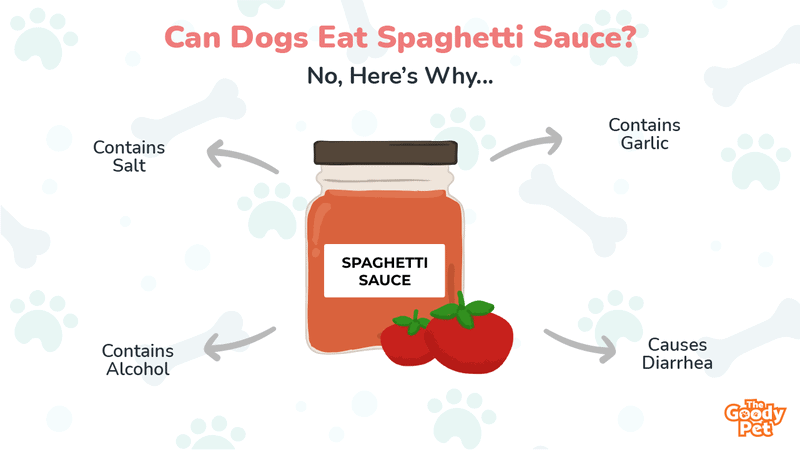We all love pasta, especially spaghetti. It is easy to prepare and goes with just about anything like meat, fish, chicken, or just with plain sauce. But think twice before giving it to your Fido.
Dogs eating spaghetti had been romanticized by the famous animation Lady and the Tramp, but can dogs eat spaghetti with our favorite tomato sauce?
No, because spaghetti with tomato sauce contains ingredients that are considered toxic to dogs. Ripe tomatoes are fine to feed dogs occasionally, but tomato sauces, for the most part, especially the bottled and canned ones, contain spices, salt, and sugar that are not beneficial to your dog’s health.
In the following article, we will list the ingredients that most spaghetti sauces contain and their effects on your dog’s health. We’d also touch on the other popular spaghetti sauces other than the tomato-based sauces that you should avoid sharing with your furry pooch.
Is Tomato Sauce Poisonous To Dogs?

Yes, there are many ingredients common in the making of tomato sauce that is considered toxic to dogs. Whether it is Marinara, Arrabiata, or Puttanesca, it is best to refrain from giving it to your dogs.
Garlic
Garlic is one of the most toxic foods for dogs. It contains the chemical compound thiosulfate, which brings about oxidative damage to their red blood cells, causing hemolytic anemia.
Initial signs of garlic toxicity include vomiting, diarrhea, stomach pains, and appetite loss. Further consumption of garlic would lead to anemia with symptoms that include pale gums, weakness, lethargy, rapid breathing, jaundice, and reddish urine.
Approximately ¼ to ½ oz of garlic for every pound of your dog’s weight would produce a harmful effect on your dog’s blood.
Onions
Just like garlic, onion belongs to the allium family of plants which are all toxic to dogs. It contains the same thiosulfate compound that has the same effect as garlic.
Whether it is sauteed into the spaghetti sauce or added in powdered form, its harmful effect is the same. Powdered onion and garlic are more potent than their fresh counterparts, so avoid them at all costs.
Toxicity to onions arises when a dog consumes more than 0.5% of its body weight in onions at one time.
Tomatoes
Tomatoes, for the most part, are not toxic to dogs. Unripe or green tomatoes are the ones you should be wary of.
However, given the tomatoes in spaghetti sauces are cooked, then this has minimal effect on their health. It is the aforementioned garlic and onions that are toxic.
Consuming large amounts, however, could cause diarrhea and stomach upsets.
Meat
Meatballs are fine for dogs as long as it is made from plain beef.
But, of course, the meatballs we usually make or buy have onions, garlic, and even sausages that have too much salt. It is best to stay away from these.
Chili Peppers
Some recipes of spaghetti sauce call for red chili flakes, like Spaghetti Arrabiata. This is a big no-no since it contains the substance capsaicin, which can irritate their digestive system.
Spicy foods can cause stomach pains, diarrhea, vomiting, and gas. Additionally, it can cause bloating, especially when your dog tries to get rid of the burning sensation in their mouths by drinking lots of water.
Mushrooms
Store-bought mushrooms are generally safe for dogs to ingest, like button, shiitake, or portobello mushrooms. They are a good source of vitamin B6, potassium, selenium, and phosphorus.
It is another thing, though, when you decide to add wild mushrooms to your sauce. Some mushrooms can cause liver damage and gastrointestinal distress.
Salt
Salt is an essential ingredient in most spaghetti sauces to make them more savory. It is also added to the water to cook the pasta.
Too much salt in your dog’s body could deplete it of liquids when its body tries to balance out the amount of sodium in the body.
A condition called hypernatremia, which is essentially a rise in the sodium levels in the blood, can make the muscles lose electrolytes resulting in stiffness, muscle shaking, and jerking.
Although sodium is an essential mineral to maintain proper metabolism, too much consumption could lead to sodium toxicity. Signs include excessive thirst, frequent urination, fever, dehydration, and seizures.
Spices
Basil and oregano are common spices that flavor tomato sauces. They have antioxidant and antimicrobial properties, plus it helps with some digestive issues like diarrhea and gas.
It should, however, only be consumed moderately.
Parsley
In small amounts, parsley can have beneficial effects on dogs like flushing out toxins in the kidney, as well as relieving pain and swelling from some inflammatory diseases.
The curly variety is the one recommended for use in dogs since it contains less of the compound called furanocoumarin that can be toxic in excessive amounts.
Capers
Capers are safe for dogs, and they are rich in vitamins and minerals, as well as flavonoids and alkaloids that can help to regulate various cellular functions. What makes it unsafe for dogs is the salted brine in which the sauce is usually bottled.
Capers can also lower blood sugar, so be careful when giving it too much to a diabetic dog that is under medication.
Red Or White Wine
Some recipes call for red or white wine, and you might not know that you are giving alcohol to your pet by feeding him sauce laced with it.
Alcohol is very toxic to dogs, and while some may evaporate during the cooking process, a small proportion can remain.
Ethanol can intoxicate and probably poison a dog, and a small amount may cause vomiting, lethargy, and loss of coordination.
What Should I Do If My Dog Ate A Lot Of Spaghetti Sauce?

The first thing to do is monitor your dog’s condition. If your pooch only ate a small amount of spaghetti sauce, then you should not probably worry too much.
Only when it shows persistent stomach aches, vomiting, and diarrhea that you should immediately get your Fido to the veterinarian.
Other negative signs to look out for are:
- Nausea
- Rapid breathing
- Continuous panting
- Restlessness
- Rapid heart rate
- Dehydration
How Do I Make A Dog-Friendly Spaghetti Sauce?
If you wish to treat your pooch occasionally with spaghetti, you can make some of your spaghetti sauce without the toxic ingredients usually found in store-bought jars.
Keeping it simple and basic is the key to sauteing a small amount of celery and carrots in olive oil. Add the ripe tomatoes and simmer until well-cooked. You can add some curly parsley, and you can ditch the salt since there are enough sugars in the celery and carrots to flavor the sauce.
Is Plain Spaghetti OK For My Dog?
Serving plain spaghetti without the sauce is OK to give to your dog as an occasional treat or snack. Pasta is just plain flour and water and has no major negative effect on your dog.
Too many carbohydrates, however, can cause diabetes in the long run since it is composed of simple sugars.
A well-balanced diet of protein, good fats, and carbohydrates should be your main goal to achieve a healthy life for your dog.






